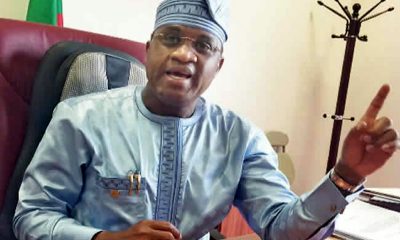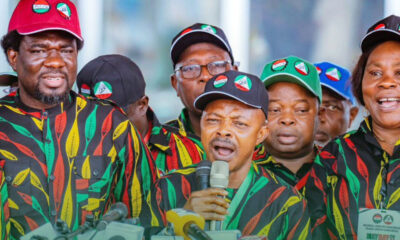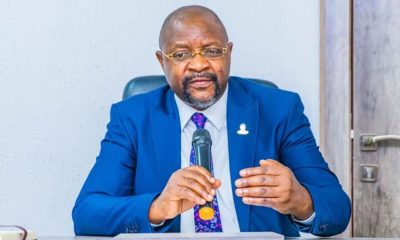News
Northern elders, economists advise Tinubu on how to end protests

Northern elders, economists advise Tinubu on how to end protests
Economic and financial experts have listed what the Bola Tinubu administration should do immediately to bring to an end the on-going nationwide protests.
In separate chats with Saturday Sun, the experts recommended that the government subsidise cost of food items, reduce the cost of governance, and ensure greater transparency in the distribution of palliatives, among other measures, to alleviate citizens’ concerns and prevent further damage.
The 10-day planned protest which began on Thursday, primarily against rising cost of living and hunger, has escalated to violence, destruction of property and loss of lives in many parts of the nation.
An economist and development expert, Aliyu ilias, said: “I think first and foremost, President Bola Tinubu should address the country. He should come up with a template of what he wants to achieve in the next one year, especially the provision of CNG. Most people are shouting hunger. It is because of the cost of transportation. If he cannot bring back fuel subsidies, he must make sure that a workable template for CNG buses is in place and all the state governors must come out and explain what they will use the money from federal government allocations to do.
“Tinubu should also rejig his cabinet by reappointing a minister of Humanitarian Affairs and also removing ministers that are not functioning well. There must be a correct template to serve Nigeria. If not, this will turn into a revolution and there is nothing he would be able to do about it.”
Prof. Femi Saibu, a lecturer in the Department of Economics at the University of Lagos, said that it is not enough for the government to simply provide palliatives; it must also ensure that these resources reach those who genuinely need them.
Saibu pointed out the existing gap between government expenditures and their actual impact on the populace, noting that it is important to flush out political intermediaries who continue to hijack public interventions for their own gain.
READ ALSO:
- Saraki replies Tambuwal: You never informed me of your withdrawal for Atiku in PDP primary
- Soyinka worries about festering corruption in Nigeria, offers solution
- Anxiety in Kogi over kidnap of local govt chairman
According to him, “It is like the more the government spends, the more the people complain of poverty or hardship. So it means the middlemen between the masses and the government are actually not allowing those things to trickle down. The Federal Government pays state governments billions of naira to alleviate the sufferings of people. Most of these people hold on to these monies while people are feeling pains and the government is having empty purses.”
He further advocated for more investment in basic infrastructure that will help improve the lives of citizens.
“Rather than giving cash to people, the government should provide basic things that people need. For instance, the government should spend heavily on health facilities, spend heavily on education, and invest directly in agriculture.
“Today the government said it has paid a lot of money to people as palliatives, but we have not seen anybody claiming they got the money. They said they gave each state several millions of bags of rice. Have you seen the bag of rice in anybody’s house?”
The economist advised the federal government to devise a new means of doing things. He said the federal government should use leaders of local communities to reach the people instead of state governors. On his part, Economic Consultant at Dynamo Consulting, Brume Nikoro asked elected leaders to cut down government wastage. He recommended empowering small scale Industries and start-ups with interest free loans and encouraging the Agricultural and Technology industries with programmes and initiatives.
In his view, lawyer and rights activist, Kabiru Akingboolu said the police authorities should ensure their personnel handle protests with civility.
He emphasized that the current widespread hardship across the country calls for a government response that goes beyond mere rhetoric.
According to Akingboolu, the government must address the nation with concrete actions to alleviate economic difficulties and prevent further unrest. He said government should also invest significantly in agriculture to boost food production. He also cautioned that prolonged protests could escalate, referencing the #EndSARS movement as a lesson in managing civil unrest.
In support, lawyer and rights activist Maduka Onwukeme added, “The government should address the protesters’ key concerns, particularly the issues of widespread hunger and inflation. Meeting these demands could lead many genuine protesters to leave the streets. Hunger fuels unrest, and negotiating with a hungry population is impractical. Effective measures to tackle these issues are crucial.”
Northern elders in a press statement signed by Prof Usman Yusuf, Hajia Najatu Muhammad, Mallam Salihu Lukman; and Dr. Umar Ardo, said the government should be pragmatic in its approach to the resolution of the crisis to amicably resolve and mitigate the risks associated with mass protests.
The elders asked the government to identify and directly engage with the youth leaders and protesters to understand and address their grievances.
They told the government to sincerely address the demands of the protesters by implementing meaningful reforms, demonstrating goodwill and a commitment to change by investing in youth development programmes, education, innovation, entrepreneurship initiatives,as well as implement policies that would enhance general economic development of the country.
They further urged the government to improve governance by enhancing transparency, accountability, and inclusivity in governance against personalised leadership, tackling corruption and ensuring equal opportunities for all citizens.
Political and economic analyst, Mustapha Hussain Olarewaju noted that while the government claims to have removed fuel subsidies, the estimated landing cost of petrol exceeds N1, 000, indicating that subsidies persist under different names.
“The floating exchange rate is driving costs higher, leading to widespread inflation,” Olarewaju stated.
He called for stabilization of fuel prices to alleviate the financial burden on citizens, as the current situation reflects a cost-push inflation scenario rather than a demand-driven one.
Olarewaju, criticised the Central Bank of Nigeria’s (CBN) recent monetary policies, particularly the increase of the monetary policy rate (MPR) to 26.25%. He argued that this approach targets demand reduction rather than addressing the root causes of inflation.
Olarewaju emphasised that to combat cost-push inflation effectively, the government should increase expenditure to stimulate productive activities instead of tightening monetary policy.
Northern elders, economists advise Tinubu on how to end protests
News
Trump Adds Nigeria to List of Countries Facing US Entry Restrictions Over Security Concerns

Trump Adds Nigeria to List of Countries Facing US Entry Restrictions Over Security Concerns
President Donald Trump on Tuesday signed a Proclamation further restricting entry to the United States for nationals from countries identified as high-risk due to “persistent and severe deficiencies in screening, vetting, and information-sharing” that threaten U.S. national security and public safety. Nigeria is now included among 15 additional countries newly subject to partial travel restrictions.
The announcement, published on the White House website in a fact sheet titled “President Donald J. Trump Further Restricts and Limits the Entry of Foreign Nationals to Protect the Security of the United States”, outlines the rationale for the move. It comes after Trump previously declared Nigeria a “country of particular concern” on October 31, 2025, citing alleged persecution of Christians.
The Proclamation maintains full restrictions on nationals from the original 12 high-risk countries—Afghanistan, Burma, Chad, Republic of the Congo, Equatorial Guinea, Eritrea, Haiti, Iran, Libya, Somalia, Sudan, and Yemen—and adds five more: Burkina Faso, Mali, Niger, South Sudan, and Syria. Countries previously under partial restrictions, Laos and Sierra Leone, now face full restrictions.
READ ALSO:
- Dangote–NMDPRA Conflict: House Launches Investigation to Stabilize Petrol Supply
- Why Buhari Retained Underperforming Appointees for Eight Years – Aisha Buhari
- Revealed: Why Buhari Withheld Support for Osinbajo’s Presidential Bid
The 15 newly restricted countries, including Nigeria, Angola, Senegal, Tanzania, Benin, The Gambia, Malawi, Mauritania, Zambia, and Zimbabwe, are subject to partial limitations, with exceptions for lawful permanent residents, visa holders, diplomats, athletes, and individuals serving U.S. national interests. Case-by-case waivers remain possible.
The White House fact sheet emphasized that the measure is aimed at preventing the entry of foreign nationals for whom the U.S. lacks sufficient information to assess security risks, ensure cooperation from foreign governments, enforce immigration laws, and support national security and counterterrorism objectives.
Trump was quoted saying, “It is the President’s duty to take action to ensure that those seeking to enter our country will not harm the American people.” The proclamation reflects ongoing efforts to restore travel restrictions on countries deemed a threat to American security and encourage compliance with vetting standards.
The fact sheet also highlighted specific challenges, including fraudulent or unreliable civil documents, high visa-overstay rates, terrorist activity, and non-cooperation with U.S. authorities, as reasons for country-specific restrictions. Meanwhile, Turkmenistan, previously restricted, has improved cooperation, resulting in partial lifting of its visa ban.
This latest travel restriction Proclamation underscores the Trump administration’s focus on border security, national safety, and stringent immigration vetting.
Trump Adds Nigeria to List of Countries Facing US Entry Restrictions Over Security Concerns
News
Revealed: Why Buhari Withheld Support for Osinbajo’s Presidential Bid
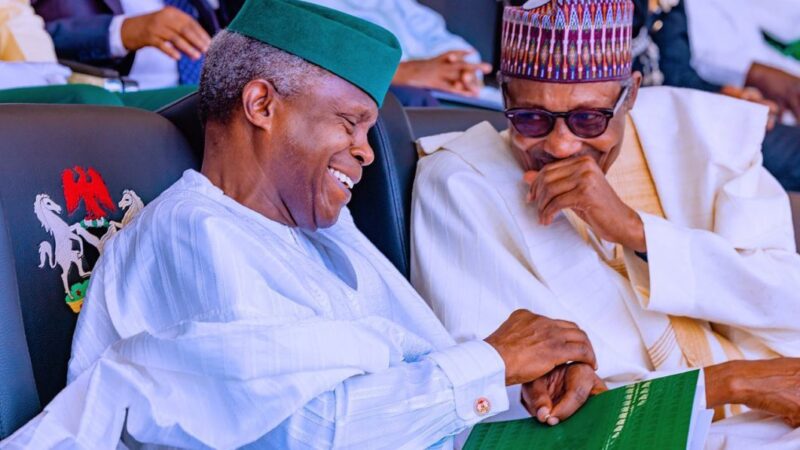
Revealed: Why Buhari Withheld Support for Osinbajo’s Presidential Bid
Fresh insights from a new biography reveal why former President Muhammadu Buhari did not support the presidential ambition of his former Vice President Prof. Yemi Osinbajo. The disclosure sheds light on the dynamics of the 2022 All Progressives Congress (APC) presidential race and Buhari’s silence during the contest.
According to the book, From Soldier to Statesman: The Legacy of Muhammadu Buhari, written by Dr. Charles Omole, Buhari reportedly declined to back Osinbajo because he had no personal relationship with him. The former president was quoted as saying, “I don’t know Osinbajo from anywhere, I met him only through President Bola Ahmed Tinubu.”
READ ALSO:
- CBN Cracks Down on Mortgage Banks, Revokes Licences of Two Non-Compliant Firms
- Former First Lady Aisha Buhari Rules Out Remarriage, Opts for Quiet Life
- French Court Orders PSG to Pay Mbappé €60m in Unpaid Wages, Bonuses
The biography notes that Buhari was also reportedly surprised by Osinbajo’s decision to contest against Tinubu during the APC presidential primaries, which Tinubu eventually won to become the party’s candidate.
Osinbajo is widely seen as a political protégé of Tinubu, having served as Attorney General and Commissioner for Justice in Lagos State during Tinubu’s governorship. He later became Buhari’s running mate in the 2015 general election, forming an eight-year federal administration.
Despite their years in government together, Buhari’s remarks suggest that his relationship with Osinbajo remained largely formal and politically arranged, rather than personal, explaining his decision to withhold support during the 2022 APC presidential contest.
The biography, recently presented at the Presidential Villa, offers a deeper look into Buhari’s political relationships and decision-making during his tenure and beyond.
Revealed: Why Buhari Withheld Support for Osinbajo’s Presidential Bid
News
Senate Backs ₦54.46trn 2026 Budget, Cuts Oil Price Benchmark to $60
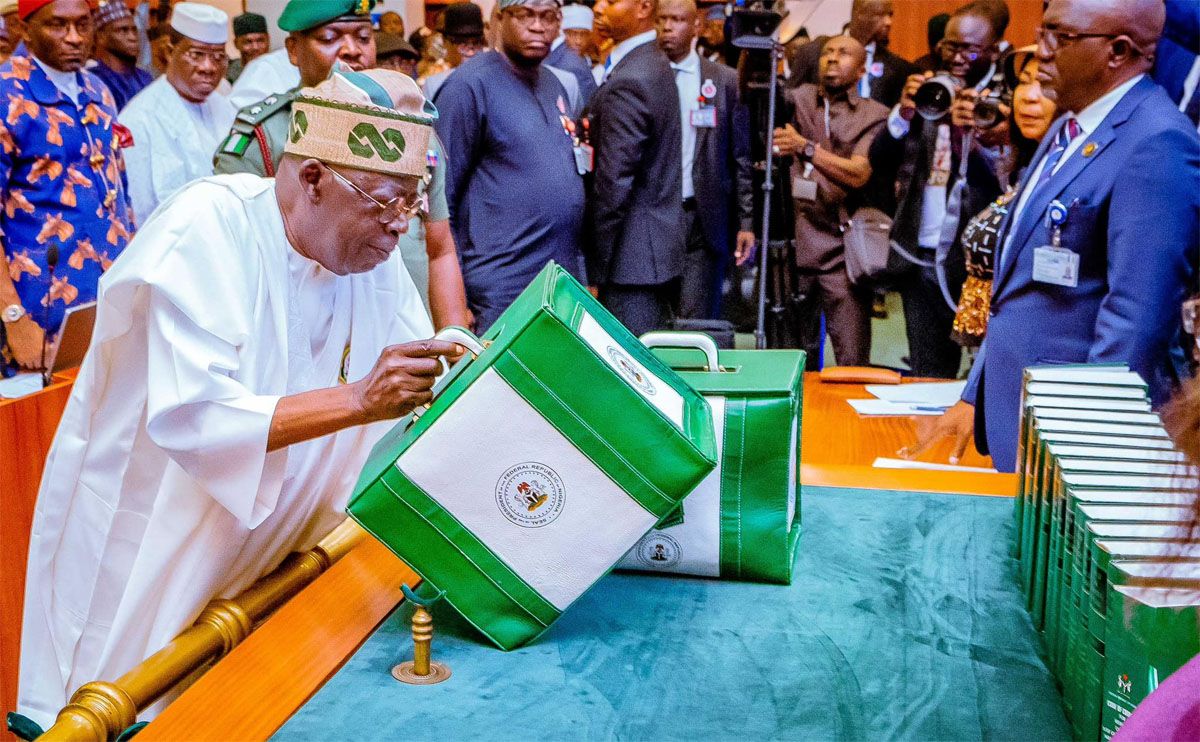
Senate Backs ₦54.46trn 2026 Budget, Cuts Oil Price Benchmark to $60
The stage is set for President Bola Ahmed Tinubu to present the 2026 Federal Government budget following the Senate’s approval of the 2026–2028 Medium Term Expenditure Framework and Fiscal Strategy Paper (MTEF/FSP).
The Senate, during plenary, approved a total ₦54.46 trillion 2026 budget, endorsing key fiscal and macroeconomic parameters despite concerns over a massive revenue shortfall recorded in 2025.
Under the approved framework, capital expenditure was pegged at ₦20.131 trillion, recurrent expenditure at ₦15.265 trillion, statutory transfers at ₦3.152 trillion, and Sinking Fund at ₦388.54 billion.
Lawmakers also approved an oil price benchmark of $60 per barrel, revised downward from the executive’s proposed $64.85, alongside projected aggregate revenue of ₦34.33 trillion, a fiscal deficit of ₦20.13 trillion, borrowings of ₦17.88 trillion, and debt service obligations of ₦15.52 trillion.
Other approved assumptions include crude oil production of 1.84 million barrels per day, inflation rate of 16.5 per cent, exchange rate of ₦1,512 to the dollar, and GDP growth rate of 4.68 per cent for 2026.
The approval followed the consideration of a report presented by the Chairman of the Senate Committee on Finance, Senator Mohammed Sani Musa (APC, Niger East). The committee recommended downward adjustments to oil price benchmarks in response to global geopolitical tensions and volatility in the international oil market.
READ ALSO:
- Inflation, Insecurity Drive Nigerians into Worst Survival Crisis in History – NLC
- Borno Police Defuse Unexploded Bomb Under Network Mast in Maiduguri
- Aisha Buhari Key to DSS DG Removal, Thwarts Alleged APC Primary Manipulation
The Senate also sustained projections for crude oil output, exchange rates and inflation for 2026–2028, citing the Central Bank of Nigeria’s stabilisation policies and ongoing economic reforms. Lawmakers expressed optimism that tax reforms would drive economic growth and improve revenue performance.
The committee further urged the Federal Government to implement a National Scanning Policy under the National Single Window of the Nigeria Revenue Service (NRS) to boost revenue assurance, reduce leakages, enhance transparency and strengthen national security.
Meanwhile, Minister of Finance and Coordinating Minister of the Economy, Wale Edun, disclosed that the Federal Government recorded a significant revenue shortfall in 2025, with actual inflows estimated at ₦10.7 trillion against a projected ₦40.8 trillion.
Speaking before the House of Representatives Committees on Finance and National Planning, Edun attributed the shortfall largely to weak oil and gas revenues, especially Petroleum Profit Tax (PPT) and Company Income Tax (CIT) from oil companies.
Despite the revenue gap, Edun said the government met key obligations, including salaries, statutory transfers, and debt servicing, through prudent treasury management.
He cautioned against rigid expenditure commitments tied to oil revenue projections, urging flexibility in spending plans amid recurring revenue underperformance.
Also speaking, Minister of Budget and National Planning, Atiku Bagudu, said the MTEF/FSP emerged from broad consultations and balanced conservative revenue assumptions with ambitious targets aimed at improving agency performance.
Chairman of the House Committee on Finance, James Faleke, stressed the need for critical scrutiny to prevent bloated budgets and ensure fiscal decisions that would move Nigeria’s economy forward.
Senate Backs ₦54.46trn 2026 Budget, Cuts Oil Price Benchmark to $60
-

 metro3 days ago
metro3 days agoNigerian Troops Repel ISWAP Attack on Borno FOB, Kill Terrorists
-
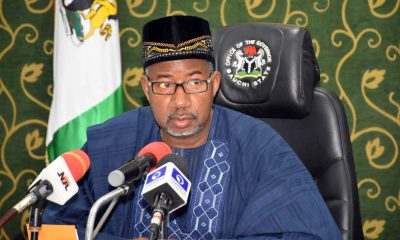
 Health3 days ago
Health3 days agoBauchi Gov Approves 100% Salary Increase for Doctors, Health Workers
-

 metro3 days ago
metro3 days agoAdelabu–Ayodele controversy: Cleric knocks minister, gives reasons (Updated)
-

 Business2 days ago
Business2 days agoNigeria FX Market: Dollar Demand Surges, Naira Slides Slightly in Festive Season
-

 metro2 days ago
metro2 days agoEnd Biafra Agitation, Tinubu Has Integrated Ndigbo Into National Development — Umahi
-

 International2 days ago
International2 days ago(UPDATED) Sydney Bondi Shooting: Anti-Semitic Attack Leaves 16 Dead, 40 Injured
-

 Politics2 days ago
Politics2 days agoAshimolowo Casts Doubt on Obi’s Northern Support as Opposition Coalition Wobbles
-

 Politics2 days ago
Politics2 days agoPeter Obi Poised to Dump Labour Party as Leadership Crisis Worsens



